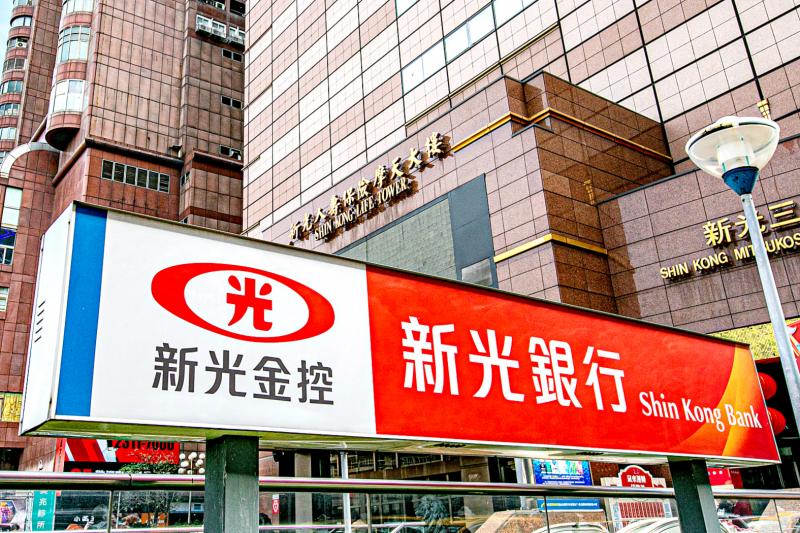The Financial Supervisory Commission (FSC) on Tuesday fined Shinkong Insurance Co (新光產險) NT$4.5 million (US$158,200) for breaching regulations governing transactions between insurers and interested parties.
A financial examination showed that the property insurer sold about 10 million shares of Shinkong Textile Co (新光紡織) to a company that was ultimately controlled by family members of Shin Kong Investment Trust (新光投信) chairman Philip Wu (吳昕紘) via block trades in January 2018, a deal that contravened the Insurance Act (保險法), the FSC said.
Shinkong Insurance borrowed NT$400 million from the Wu family members to buy the Shinkong Textile shares, but four months later sold the shares to the same Wu family members at a similar price via another block trade, Insurance Bureau Deputy Director-General Wang Li-hui (王麗惠) told a news conference.

Photo courtesy of Shin Kong Financial Holding Co
“The interested-party transactions were aimed at helping the Wu family members boost their stake in Shinkong Textile, while avoiding supervision from Shinkong Insurance’s board of directors,” Wang said.
If Shinkong Insurance wanted to comply with the regulations governing transactions between insurers and interested parties, it had to notify its board members in advance, she said.
More than half of the members needed to approve the deal, with at least two-thirds of the board in attendance, she said.
Shinkong Insurance told the commission that neither its chairperson nor general manager knew about the matter, Wang said.
The commission found that it was a vice president of Shinkong Insurance who decided to sell the Shinkong Textile shares, but the person was not in charge of the insurer’s investment operations, which indicated that the insurer had poor internal controls, Wang said.
The vice president has retired, she said.
The FSC has banned Shinkong Insurance from trading securities of its interested parties in after-hours trading or in block trading for two years, she said.

RUN IT BACK: A succesful first project working with hyperscalers to design chips encouraged MediaTek to start a second project, aiming to hit stride in 2028 MediaTek Inc (聯發科), the world’s biggest smartphone chip supplier, yesterday said it is engaging a second hyperscaler to help design artificial intelligence (AI) accelerators used in data centers following a similar project expected to generate revenue streams soon. The first AI accelerator project is to bring in US$1 billion revenue next year and several billion US dollars more in 2027, MediaTek chief executive officer Rick Tsai (蔡力行) told a virtual investor conference yesterday. The second AI accelerator project is expected to contribute to revenue beginning in 2028, Tsai said. MediaTek yesterday raised its revenue forecast for the global AI accelerator used

TEMPORARY TRUCE: China has made concessions to ease rare earth trade controls, among others, while Washington holds fire on a 100% tariff on all Chinese goods China is effectively suspending implementation of additional export controls on rare earth metals and terminating investigations targeting US companies in the semiconductor supply chain, the White House announced. The White House on Saturday issued a fact sheet outlining some details of the trade pact agreed to earlier in the week by US President Donald Trump and Chinese President Xi Jinping (習近平) that aimed to ease tensions between the world’s two largest economies. Under the deal, China is to issue general licenses valid for exports of rare earths, gallium, germanium, antimony and graphite “for the benefit of US end users and their suppliers

Dutch chipmaker Nexperia BV’s China unit yesterday said that it had established sufficient inventories of finished goods and works-in-progress, and that its supply chain remained secure and stable after its parent halted wafer supplies. The Dutch company suspended supplies of wafers to its Chinese assembly plant a week ago, calling it “a direct consequence of the local management’s recent failure to comply with the agreed contractual payment terms,” Reuters reported on Friday last week. Its China unit called Nexperia’s suspension “unilateral” and “extremely irresponsible,” adding that the Dutch parent’s claim about contractual payment was “misleading and highly deceptive,” according to a statement

Artificial intelligence (AI) giant Nvidia Corp’s most advanced chips would be reserved for US companies and kept out of China and other countries, US President Donald Trump said. During an interview that aired on Sunday on CBS’ 60 Minutes program and in comments to reporters aboard Air Force One, Trump said only US customers should have access to the top-end Blackwell chips offered by Nvidia, the world’s most valuable company by market capitalization. “The most advanced, we will not let anybody have them other than the United States,” he told CBS, echoing remarks made earlier to reporters as he returned to Washington